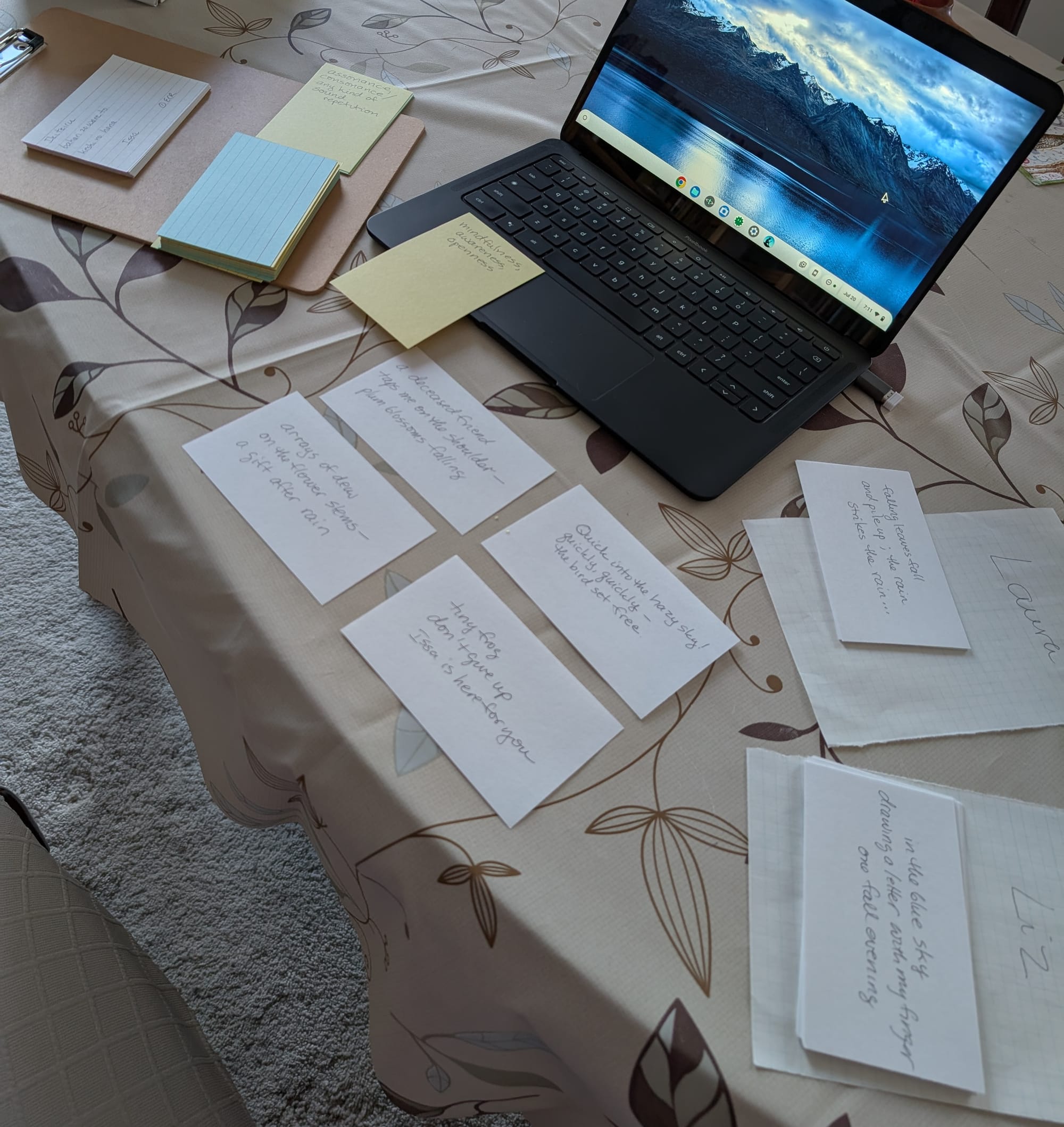Today was so great: Liz and I played the Zoom-based BYOP (Bring-Your-Own-Poetry) version of "Know Your Haiku" ... and it was so much fun! You can read the instructions for the game here. I made one small adjustment to the instructions based on what we learned today, but everything else flowed really nicely. The game will be even better with 3 or more players, but it definitely works as a game for just 2 players!
What made it especially fun for me was that Liz brought a lot of her own haiku to the game, and she also brought poems from Jon Muth's Hi, Koo! book (I wrote about that book in a previous post), which are really wonderful haiku for both children and adults. Getting to hear his poems as part of this game made them even more memorable for me!
I was excited because for a few of the cards that I played, I had both the English and the Japanese (romanji) on my card, so I was able to look at the Japanese and see what words I recognized. Even though I just started working on haiku in Japanese 10 days ago (thanks to the Boutwells' Learn Japanese through Haiku books), I was able to recognize some words and appreciate the poems even more as a result.
Here are some of the future directions we talked about:
- A Think-about-Haiku version of the game for people who are already familiar with basic haiku features: instead of using Feature cards, we would play with Quote cards, using the quotes I have found from the haiku books that I have been reading (I have found a LOT of really good books, so I have heaps of quote cards already). These quotes go into more detail about different aspects of haiku, exploring the features in greater depth, providing more cultural context, etc. I've been using these Quote cards for my solitaire version of the game, and based on how the game went today for Liz and me, I think we are ready to try playing this more "advanced" version of the game together too.
- A children's version of Know-Your-Haiku with simpler features that would emphasize more concrete, specific aspects of the poems; I'm currently working on writing versions of classic Japanese haiku adapted for children, so that should help me in thinking about a good Features list for young readers, plus I have acquired some more really nice haiku books for children that will expand my kids-haiku awareness.
- Deadline coming soon: submissions for Haiku Society of American's virtual conference is August 15. I'm not quite sure how to make all the game-work I've done this summer into a conference submission, but I'll figure something out. Even if I don't get accepted, it will be useful to give it a try! I could submit it as a "presentation" but they have a box for "other" so I think I will actually propose it as a game we will play (rather than a presentation about the games); it will have to be the bingo game so that people can just show up without any preparation, but I think the bingo game is good too because I built it around the Living Haiku Anthology, so that's a way to promote the fact that there is all that Creative-Commons-licensed haiku poetry ready for educational re-use.
- In addition to haiku, I want to repurpose this same game design for riddles and for Latin proverbs; I am honestly feeling really good about this game design now, and I think it has a lot of potential for other tiny things that fit on index cards... like riddles and proverbs!
So, lots to do... but it's all such good stuff. The more I keep learning about haiku, the more possibilities I see. Liz asked me about just how this haiku thing got started for me, and it was fun telling her about the series of happy accidents that led me here. Life-changing happy accidents as it's turned out!
Here's a picture of what the various cards looked like around my laptop when Liz and I played this game together. From left to right: my Haiku Poetry deck (white index cards), the Features deck, unplayed and played (colored index cards), current Feature card (on the laptop keyboard), my four haiku poem cards, the "pot" of cards I've won (on a half-piece of paper with my name on it), the "pot" of cards that Liz has won (on a half-piece of paper with her name on it).
